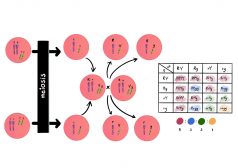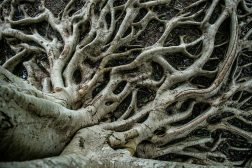Hair
1. The collection or mass of filaments growing from the skin of an animal, and forming a covering for a part of the head or for any part or the whole of the body.
2. One the above-mentioned filaments, consisting, in invertebrate animals, of a long, tubular part which is free and flexible, and a bulbous root imbedded in the skin. Then read he me how Sampson lost his hairs. (Chaucer) And draweth new delights with hoary hairs. (Spenser)
3. Hair (human or animal) used for various purposes; as, hair for stuffing cushions.
4. (Science: zoology) a slender outgrowth from the chitinous cuticle of insects, spiders, crustaceans, and other invertebrates. Such hairs are totally unlike those of vertebrates in structure, composition, and mode of growth.
5. An outgrowth of the epidermis, consisting of one or of several cells, whether pointed, hooked, knobbed, or stellated. Internal hairs occur in the flower stalk of the yellow frog lily (Nuphar).
6. A spring device used in a hair-trigger firearm.
7. A haircloth.
8. Any very small distance, or degree; a hairbreadth.
hairs is often used adjectively or in combination; as, hairbrush or hair brush, hair dye, hair oil, hairpin, hair powder, a brush, a dye, etc, for the hair. Against the h
97e
air, in a rough and disagreeable manner; against the grain. You go against the hair of your professions. .
(Science: anatomy) hair bracket, the thinnest metal space used in lines of type. Hair stroke, a delicate stroke in writing. Hair trigger, a trigger so constructed as to discharge a firearm by a very slight pressure, as by the touch of a hair. Not worth a hair, of no value. To a hair, with the nicest distinction. To split hairs, to make distinctions of useless nicety.
Origin: oe. Her, heer, haer, as. Haer; akin to OFries, her, D. & g. Haar, OHG. & Icel. Har, dan. Haar, Sw. Har; cf. Lith. Kasa.
Dictionary > Hair








